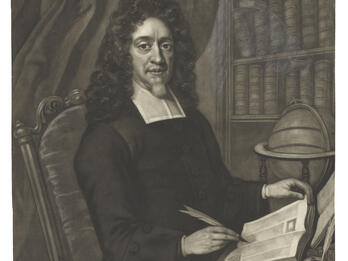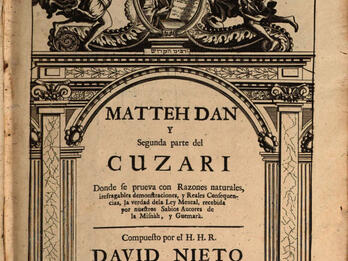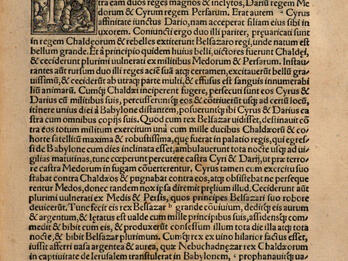Letter to Isaiah Bassan
O great mountain (Zechariah 4:7), the exalted and raised (Isaiah 52:13), precious cornerstone (Isaiah 28:16), my teacher, my rabbi, may the Merciful One guard and bless him, may God protect him and grant him blessing:
I received a letter from your honor complaining about the master, my blessed father. Now, your honor does not lack clear proofs of my father’s generosity, and therefore he can properly judge him under the circumstances. I will not write at length about this matter, because I know that his honor is an honest man.
I also saw that his honor was happy that I produced fruitful ideas on revealed matters,1 and I too was pleased, praise the Lord, that God has shown me favor in all areas of His Holy Torah, which is all perfect and restores the soul (Psalms 19:8). However, I think I can read between the lines, and I know that what his honor would really like and what would please him best is if I were to leave aside esoterica and concentrate on the revealed Torah. But for my part, I am very sorry that I am located far from his eminence, since if I were living close to him I would be ceaselessly telling him, that a man such as him, a noble and great leader of Israel, has departed from the inner goodness, the bright light, the fine flour, to satisfy his lofty soul with merely the grass of the field, which is the simple meaning of the Torah, and the bitter suffering of a fortiori arguments and verbal analogies, regarding which the Zohar applies the verse: And they made their lives bitter with hard service, etc. (Exodus 1:14).
Does not the verse cry out: All flesh is grass, and all its kindness is like the flower of the field (Isaiah 40:6)? That is, all kindness that men perform, they do so for their own sake. The Holy Divine Presence waits for her children to lead her out of the exile, but there is none to guide her among all the sons whom she has brought forth (Isaiah 51:18). Will this be good in the eyes of the Lord? (Leviticus 10:19). The bottom line is: How can we be pleasing to our Creator, blessed be He, with all these complex dialectics and numerous legal rulings? Meanwhile, there is not one who makes the effort to stand in the secret council of God and reveal the light of His glory to the Divine Presence, regarding which it is stated: And I will look upon it, that I may remember the everlasting covenant (Genesis 9:16), i.e., look upon the secrets of the Torah.
The holy R. Simeon bar Yoḥai was not speaking in secret when he said on the verse: If you do not know, fairest among women (Song of Songs 1:8; Zohar ḥadash, p. 70, 74), that one who does not know the secrets of the Torah, even if he has performed many good deeds, will be removed from all the gates of that world. Did the holy Ari [R. Isaac Luria], may his memory be for the life of the world to come, hide his words when he said that someone who is bright should spend at most an hour or two studying halakhah, whereas one who is not bright should not study it at all; rather, his main focus should be on midrashim, aggadic passages, and the esoteric kabbalistic traditions of the Torah? If so, why should we leave aside the essential and take hold of the secondary?
This is the general rule: A person will find in the future world only the light of that which he started to gain an understanding in this world. One who knows something about essential matters will enjoy the internal light, but one who failed to grasp them will not get to enjoy them in any manner.
Now, if you will claim: “But laws are necessary in Israel—shall we then abandon them?” No, we will not abandon them, but we will set fixed times for them, as they are indispensable. However, we will not spend all our time on them, God forbid. This is one of the evils of this world, as most of the sages of Israel have become distanced from the truth and from the pleasant light, the glory of the Lord our God, to chase after dialectics of vanity.
God examines the hearts, and He knows if one’s intention is for good or evil, and such people are motivated solely by greed and honor, and they will choose anything that will provide them with all that their soul desires of these things. I am very sorry for the great man, his eminence, that he does not place his main focus on that which is worthy of a man such as him, so that he can enjoy, according to his ability to eat from the delicacies of the king, the King of the World. As for me, I only have the strength to do what I can do. I will bless the Lord, who has given me counsel (Psalms 16:7) to follow the path of truth; may He always place in the hearts of His children that which is best for them. I feel I do not want to be suspected regarding oaths, and this too is for the good.
I embrace the darling son, our teacher, the rabbi, and his son, may the Merciful One guard and bless him, and may the Lord, God of the Heavens, fulfill the desires of their hearts for the good, for a long life, Amen, so may it be His will.
I drink his words with thirst, Moses ḥayim Luzzatto
Notes
[A reference to a recent interpretation of a talmudic passage by Luzzatto, for which his rabbi had expressed appreciation.—Trans.]
Credits
Moses Ḥayim Luzzatto, “Letter to Basan (Hebrew)” (Letter, Padua, 1732). Republished in: Moshe Ḥayyim Luzzatto, Igrot Ramḥa'l u-vene doro, ed. Mordekaï Chriqui (Yerushalayim: Mekhon Ramḥa’l, 2001), 319–322.
Published in: The Posen Library of Jewish Culture and Civilization, vol. 5.





